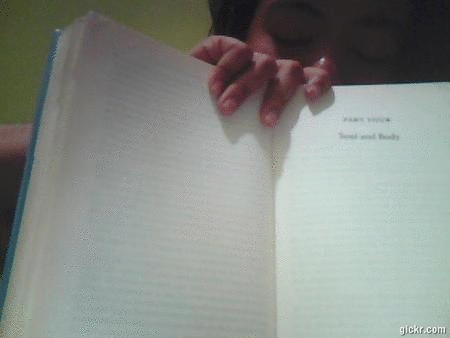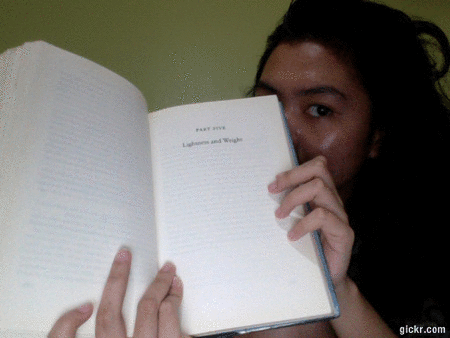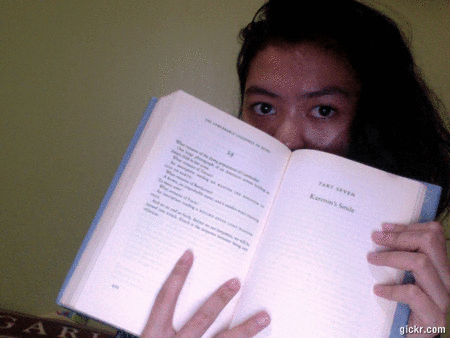this chapter attempts to stretch the common given definitions of various objects, some of them are general, some others specific, to be explored in relation to the story and its characters.
for example
WOMANthe explanation of the word "woman" continues to build a bridge connecting this commonly used word to the characters' traits, pasts and thoughts, how the word is used in various contexts in the book, for example, certain women cannot be seen as women by some men; what makes them women, what makes them not. sometimes deviant usages of such words are the underlying reason for some misunderstanding in the book, as some characters do not perceive the words like what the other party does.
Being a woman is a fate Sabina did not choose. What we have not chosen we cannot consider either our merit or our failure. Sabina believed that she had to assume the correct attitude to her unchosen fate. To rebel against being born a woman seemed as foolish to her as to take pride in it.
the difference between two points of view is most noticeable upon this phrase
LIVING IN TRUTHSabina, like Tomas, has several lovers and Franz is one of them.The root of Sabina's infidelity is betrayal, she longs to continually betray, be disobedient. The usual case of infidelity between a man and a woman is reversed here, Sabina the female being "charmed by betrayal than by fidelity" whereas Franz the male assumes that "Sabina would be charmed by his ability to be faithful". (Although, Franz has a wife whom he no longer desires.)
Such is the formula set forth by Kafka somewhere in the diaries or letters. Franz couldn't quite remember where. But it captivated him. What does it mean to live in truth? Putting it negatively is easy enough: it means not lying, not hiding, and not dissimulating. From the time he met Sabina, however, Franz has been living his lies. He told his life about nonexistent congresses in Amsterdam and lectures in Madrid; he was afraid to walk with Sabina through the streets of Geneva. And he enjoyed the lying and hiding: it was all so new to him. He was as excited as a teacher's pet who has plucked up the courage to play truant.
For Sabina, living in truth, lying neither to ourselves nor to others, was possible only away from public: the moment someone keeps an eye on what we do, we involuntarily make allowances for that eye, and nothing we do is truthful. Having a public, keeping a public in mind, means living in lies. Sabina despised literature in which people give away all kinds of intimate secrets about themselves and their friends. A man who loses his privacy loses everything, Sabina thought. And a man who gives it up of his own free will is a monster. That was why Sabina did not suffer in the least from keeping her love secret. On the contrary, only by doing so could she live in truth.
Franz, on the other hand, was certain that the division of life into private and public spheres is the source of all lies: a person is one thing in private and something quite different in public. For Franz, living in truth meant breaking down the barriers between the private and the public. He was fond of quoting Andre Breton on the desirability of living "in a glass house" into which everyone can look and there are no secrets.
In this particular chapter their relationship finally comes to an end, after Franz reveals Sabina's identity to his wife. Sabina, whose main principle is "living in truth" (which means a complete privacy to her) could not bear having a tiny prick of peephole to her private life. She has to end it. She leaves the town after making love to Franz for the last time, leaving no trace behind.
Sabina is then settling in Paris, overwhelmed by her own melancholy. What makes her wonder is the absence of heaviness depressing her body (which is supposed to be present in order to drown one in melancholy), instead the only thing she has is lightness. "Her drama was a drama not of heaviness but lightness. What fell to her lot was not the burden but the unbearable lightness of being."
Sabina begins to ponder about her acts of betrayal. She has nothing left to betray: parents, husband, country, love, they are all gone, betrayed. Because of this she again feels more emptiness around her, thinking is emptiness "the goal of all her betrayals?"

4) soul and body
The story goes back to tomas and tereza. I assume that the we are going back to an earlier time frame, because in the previous chapter tomas and tereza (the only link to sabina's past, according to her) are dead. The chapter is saturated with politics and the tension between Czech and Prague and Soviet Union. The drama between Tereza's body and soul again takes place in this chapter. Disgusted by the reflection of her soulless body in the mirror, but mainly exasperated by the fact that her body alone is not enough for Tomas, she resorts to flirtation, exposing her soul to what tomas has been doing on her all these years: infidelity. But what has been intended to be her minute escapism turns out to be an imminent disaster, for the real identity of the engineer she makes love to transpires to be a secret police agent.
Another important point in this chapter is when Tereza is being sent up to a hill by Tomas to commit suicide, with the help of some hired killers. In the end Tereza could not bear the thought of her death, confessing to the killer that "it(her wanting death) wasn't her choice." The killer puts down his rifle and lets Tereza descend back to the town.

5) lightness and weight
The politics game continues in this chapter: the rising need for a proof of innocence of certain groups, how the criminals were not criminals in the first place, but merely enthusiasts who longed for a fast track to heaven. Another issue raised in the second sub-chapter is whether one is still considered guilty when he claims to be deprived from the knowledge of the issue, which I found fascinating
Tomas develops his analogy and sends it to the national paper. He is then invited for a talk, discussing about the publishing of his letter, which has actually been amputated in such a way that it portrays only Tomas' hatred; as if firmly stating that those who claim to be non-believers deserve to be punished like Oedipus, be blind and wandering away. He is indeed unhappy but there is nothing he can really do about that. His letter creates a spur and many parties (especially government and pro-govt organisation/people) try to persuade him (in an impressive gamut of ways) to refute --not just retract-- his statement. Tomas rejects all the offer and in turn loses his job as a respected surgeon.But, he said to himself, whether they knew or didn’t know is not the main issue; the main issue is whether a man is innocent because he didn’t know. Is a fool on the throne relieved of all responsibility merely because he is a fool?
Let us concede that a Czech public prosecutor in the early fifties who called for the death of an innocent man was deceived by the Russian secret police and the government of his own country. But now that we all know the accusations to have been absurd and the executed to have been innocent, how can that selfsame public prosecutor defend his purity of heart by beating himself on the chest and proclaiming, My conscience is clear! I didn’t know! I was a believer! Isn’t his “I didn’t know! I was a believer!” at the very root of his irreparable guilt?
It was in this connection that Tomas recalled the tale of Oedipus: Oedipus did not know that he was sleeping with his own mother, yet when he realised what had happened, he did not feel innocent. Unable to stand the sight of the misfortunes he had wrought by “not knowing,” he put out his eyes and wandered blind away from Thebes.
It is necessary: to defend ourselves against flattery, this is what I have always been reminding myself for years. The book restates it very clearly and when I read it I could relate to it with comfortable ease.
Since no one had thought to praise Tomas in quite some time, he listened to the plump official very carefully, and he was surprised by the precision and detail of the man's knowledge of his professional career. How defenceless we are in the face of flattery! Tomas was unable to prevent himself from taking seriously what the Ministry official said.
But it was not out of mere vanity. More important was Tomas' lack of experience. When you sit face to face with someone who is pleasant, respectful and polite, you have a hard time reminding yourself that nothing he say is true, that nothing is sincere. Maintaining nonbelief (constantly, systematically, without the slightest vacillation) requires tremendous effort and the proper training -- in other words, frequent police interrogations. Tomas lacked that training.
The introduction (the first few sub-chapters) of The Grand March is very exquisitely written, it attains/contains so much power/strength from its wording and concepts. The first old concept introduced here is the theological justification of shit. (Yes, the literal shit, not bullshit shit) It argues that when Adam and Eve were still in heaven they did not defecate at all, because the paradise was full and only full of all things good. Only when they were expelled from paradise did they start to defecate, it is argued that the main purpose shit serves is to make humans feel disgust.
The chapter builds up on this concept, develops further, snaps more ideas in and makes use of them to again, establish its connection with the characters. To me reading the chapter felt like watching a tree growing from its baby seed--and in this case, the seed is shit.

7) karenin's smile
The last chapter opens with a rather descriptive paragraph of a sunset scene (not very descriptive at all, actually, but 'descriptive enough' for milan kundera who usually employs illustrations instead for introductions), which seems to indicate an immense longing for a good break after a heavy ride. But even with its picturesque wording the author refuses to leave the philosophical aspect out; this chapter weighs heavily on one of the most basic concepts of relationship between living things: the love between a human and an animal.
Tereza's love for Karenin (her dog) has what her love for Tomas lacks, which does not make it essentially superior quantitatively, but qualitatively. These two are very beautiful, substantial paragraphs; not merely a favourite. You can skip others but not these.
From this jumble of ideas came a sacrilegious thought that Tereza could not shake off: the love that tied her to Karenin was better than the love between her and Tomas. Better, not bigger. Tereza did not wish to fault either Tomas or herself; she did not wish to claim that they could love each other more. Her feeling was rather that, given the nature of the human couple, the love of man and woman is a priori inferior to that which can exist (at least in the best instances) in the love between man and dog, that oddity of human history probably unplanned by the Creator.
It is a completely selfless love: Tereza did not want anything of Karenin; she did not ever ask him to love her back. Nor had she ever asked herself the questions that plague human couples: Does he love me? Does he love anyone more than me? Does he love me more than I love him? Perhaps all the questions we ask of love, to measure, test, probe, and save it, have the additional effect of cutting it short. Perhaps the reason we are unable to love is that we yearn to be loved, that is, we demand something (love) from our partner instead of delivering ourselves up to him demand-free and asking for nothing but his company.
I really liked the book, but there were various parts that I think would be much better understood had I possessed a better knowledge of history and philosophy. It left me a lot of post-reading thoughts not many other books gave because the time allocated to the reading was simply not enough to absorb all the ideas explored. (which unfortunately are gone forever because blogspot failed to save my draft earlier, I had to rewrite this essay) The book explores philosophy from microscopic and macroscopic angles, and it is interesting to see how the author builds bridges between the two perspectives, between personal and universal, between general and specific, between divine and kitschy.
The book has a massive breadth; it includes the concepts of politics, love, family, infidelity, divinity, authority, power, and adulthood. It is impossible to find nothing you can relate to. Reading the book feels like learning, accommodating: we acquire new facts, new ideas, and a few pages later we are introduced to other new ideas that contradict the previous ones, so we adjust our facts, weigh them and learn what would actually be the truest. Also, there is more to its storyline and philosophical analogies which you should read yourself, I myself am intending to put this on the list of books I want to reread.

No comments:
Post a Comment